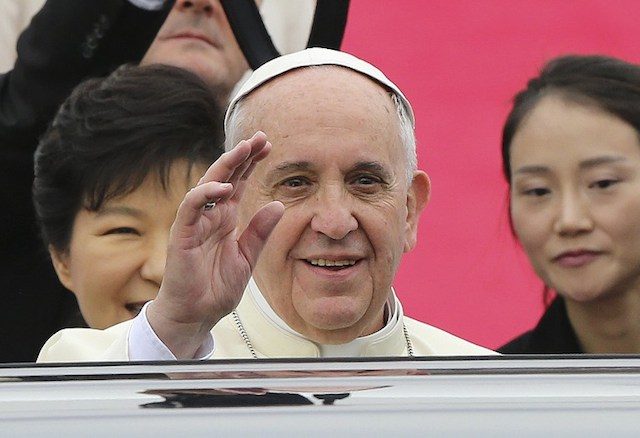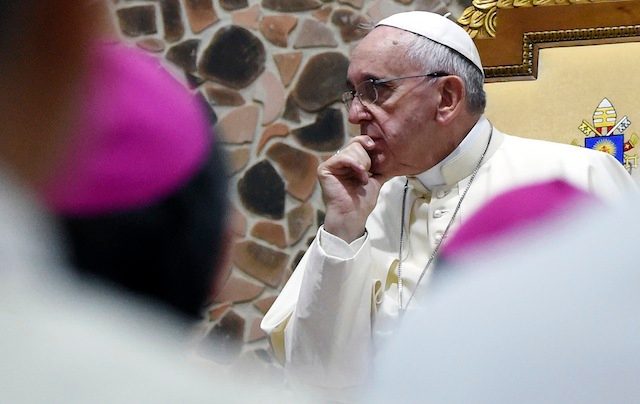SUMMARY
This is AI generated summarization, which may have errors. For context, always refer to the full article.

Communications between the Vatican and Beijing have never been easy or particularly fruitful, and the problem China poses for the Holy See’s plans to expand Church membership in Asia loomed large over the pope’s first visit to the region, which wrapped up Monday, August 18.
The trip to South Korea was partly planned to coincide with the gathering of thousands of young Asian Catholics for Asian Youth Day in the city of Daejeon.
Organizers said Beijing prevented a number of Chinese Catholics from traveling to the event and, according to some reports, participating Chinese priests were warned not to attend any function involving the pope.
“In a particular matter like this we have to be discreet,” Vatican spokesman Federico Lombardi told Agence France-Presse when asked to comment on the Chinese action.
China did allow Pope Francis to fly over China on his way to South Korea – a courtesy it did not extend to pope John Paul II who was forced to fly around when he travelled to Seoul in 1989.
In line with papal protocol, that allowed Pope Francis to send a brief goodwill message directly to President Xi Jinping as he entered Chinese airspace.
Although the message was widely reported by the international media, it failed to reach Xi due to some unexplained technical issue, and the Chinese embassy in Rome ended up having to request its retransmission.
Although he did not directly address China during his five days in South Korea, the pope made several remarks that were seen as reaching out to Beijing, including a call for dialogue with Asian nations that have no formal ties with the Vatican.
“You ask me if I want to go to China? Certainly, even tomorrow,” Francis later reporters as he flew home.
“But the church asks for the freedom to do its job in China, there is no other condition,” he said.
China severed ties with the Holy See in 1951, and does not recognize the Vatican’s authority over its Catholic community.
Experts estimate that there are as many as 12 million Catholics in China, with about half in congregations under the officially administered Chinese Catholic Patriotic Association.
The rest belong to non-sanctioned or so-called “underground” churches, with clergy loyal to the Vatican.
A question of sovereignty
China’s ruling Communist Party is officially atheist and Beijing exercises strict control over all recognized religious institutions, including vetting sermons.
The main point of contention concerns the approval of bishops, where the Vatican sees its authority as absolute.
From China’s viewpoint, ceding control of such appointments would be tantamount to a loss of political sovereignty.
“China sees bishops as social leaders,” said Anthony Lam, a senior researcher at Holy Spirit Study Centre in Hong Kong, which closely monitors the church in mainland China.
“And because China doesn’t really have civil society, social leaders there are seen as part of the government,” Lam said.

In unscripted remarks during a speech to Asian bishops on Sunday, August 17, Pope Francis stressed the dialogue he sought with countries like China was “fraternal” and not political.
“Christians are not coming to Asia as conquerors,” he added.
Francis’s papal predecessor Benedict had similarly stated the Vatican had no intention of undermining Beijing’s rule.
Despite such assurances, dialogue between the Vatican and Beijing has rarely risen beyond the level of low-level informal talks.
Goodwill ‘not enough’
“Goodwill is fine, but goodwill is not enough. There aren’t going to be any miracles in this relationship,” said Gianni Criveller, a Hong Kong-based Catholic theologian and watchdog of religious issues in China.
Criveller is “not very optimistic” of any breakthrough in the short-term, partly because of the factional nature of Chinese politics, especially between hardline and more liberal elements.
“When the infighting breaks out, religion is one issue that can be used as an ideological weapon,” he said.
“So nobody in the leadership wants to be seen as compromising on something like religion as it will just hand ammunition to their critics.”
And the Vatican is no stranger to factional politics either.
While some power-brokers may push for some sort of accommodation with China, others balk at any move that could be seen as accepting government interference in the running of the Church’s affairs.
“There is great concern about setting a precedent,” Lam said.
Some feel the Vatican places too much emphasis on the idea of diplomatic relations with Beijing – a goal that prevents it speaking out too loudly about injustices in China for fear of alienating the government.
“My personal opinion is that no agreement is better than a bad agreement,” said Criveller.
“I would stop sending envoys around the world and focus more on supporting Catholics in China and speaking about their plight more openly,” he added. – Rappler.com
Add a comment
How does this make you feel?
There are no comments yet. Add your comment to start the conversation.